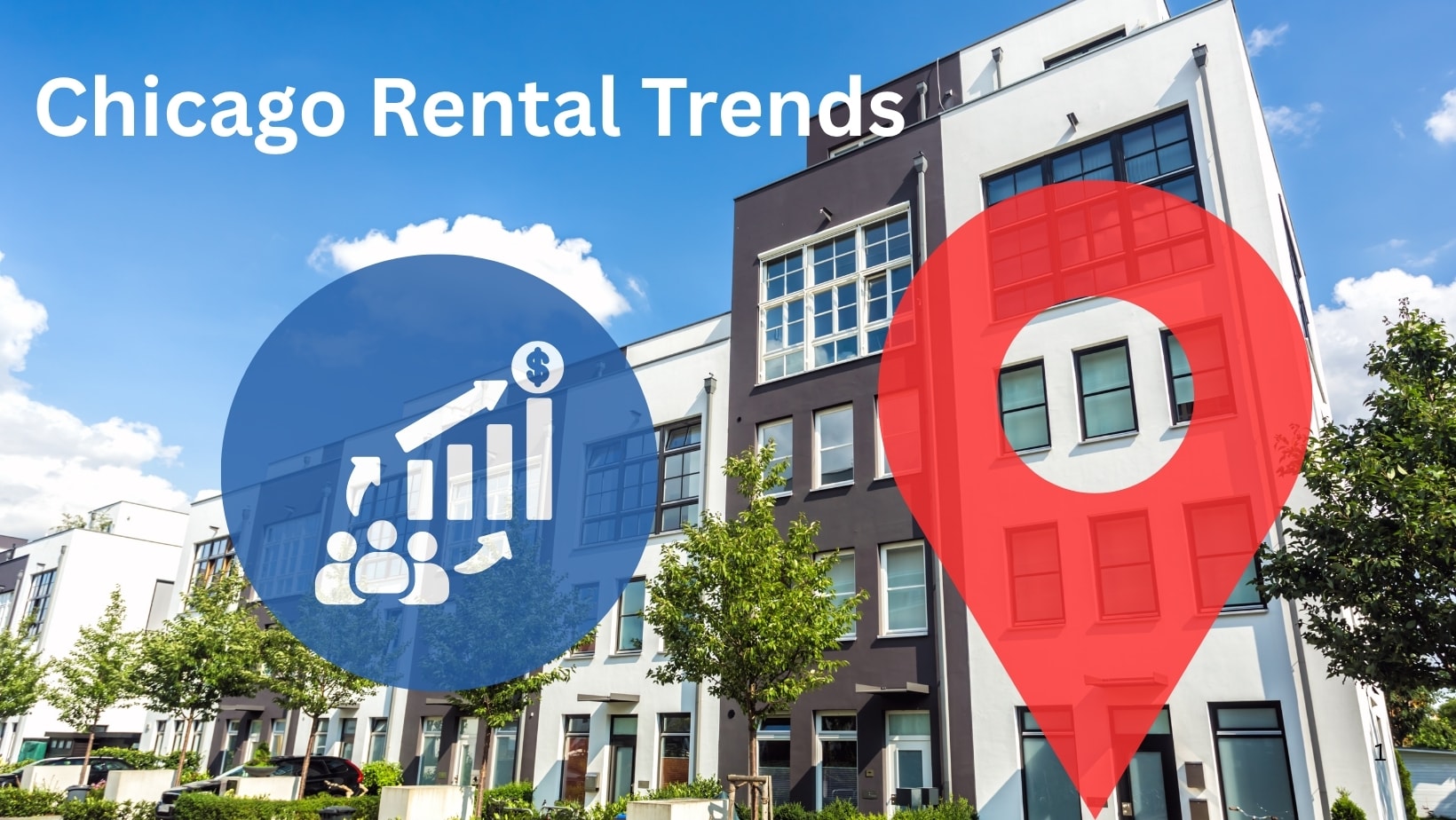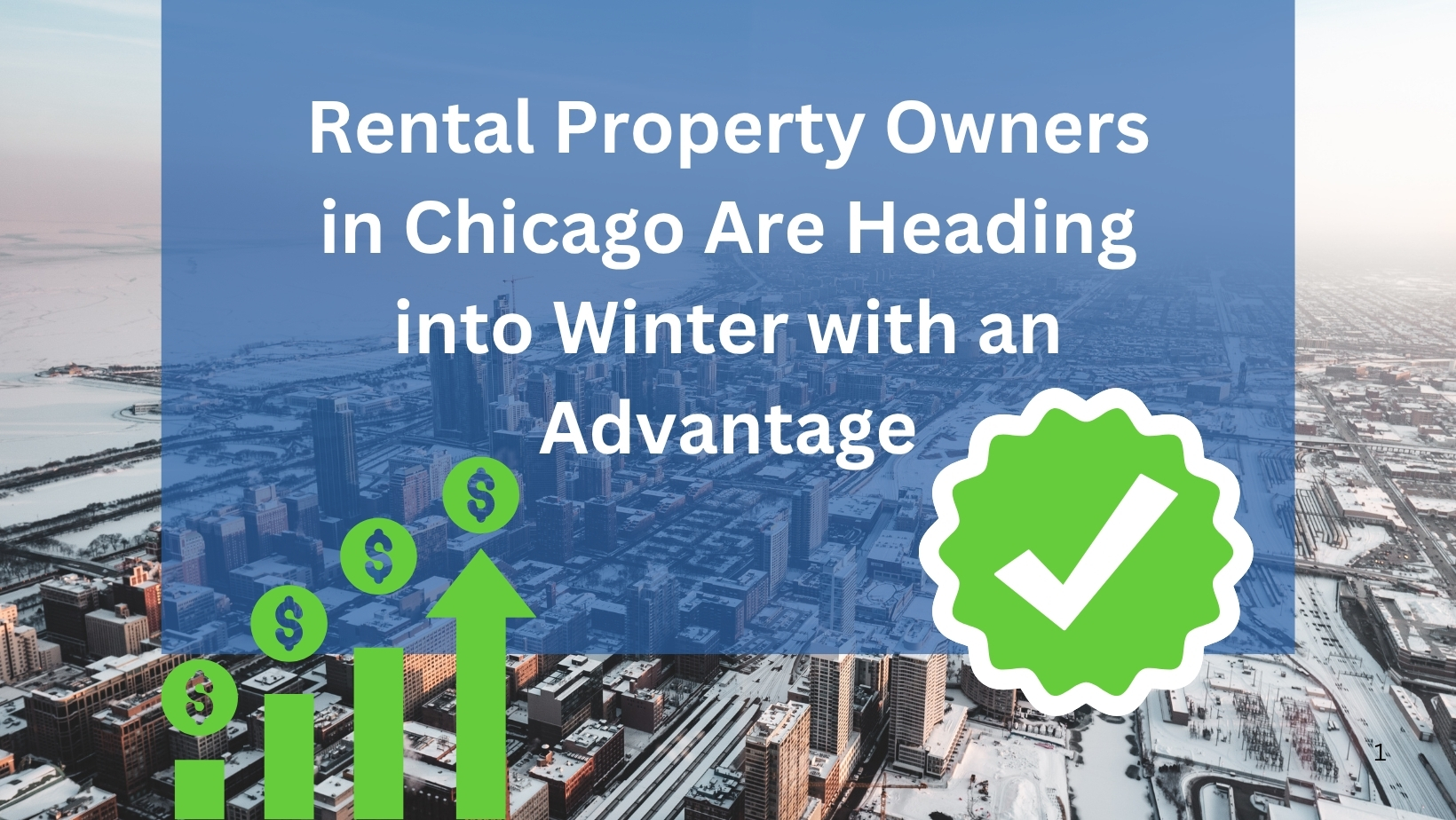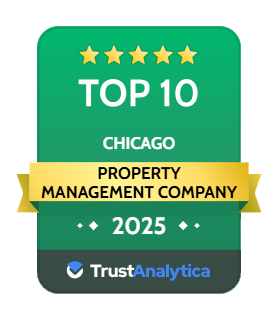As 2025 winds down, rental property owners in Chicago are entering winter in a stronger position than most markets across the country. The Chicago rental market has tightened, with vacancy rates now sitting between 4.7% and 4.9%, some of the lowest levels since 2019. For landlords, that means increasing demand, rising rents, and valuable opportunities to optimize returns across a variety of rental properties and property types.
While Chicago isn’t one of the coastal markets, it continues to rank among the nation’s most expensive rental markets, with living costs and average rent levels that rival major cities on both coasts.
Tight Vacancy Rates + Rising Rents = Opportunity

Recent market trends show that effective rents in Chicago neighborhoods are up 5.5% year over year, outpacing the national average. Limited construction and strong tenant demand continue to drive these gains, and with new housing supply falling short of expectations, rent growth is expected to continue into early 2026.
At the same time, occupancy across rental units in the Chicago rental market is holding steady near 95.8%, signaling strong absorption and healthy tenant pipelines.
What’s Driving These Rent Trends?

Limited new inventory – Only about 450 new apartments were projected this year across the Loop, Fulton Market, and West Loop—down from over 2,100 the previous year. This sharp decline in development is pushing rents higher and increasing competition among renters.
Elevated rental demand – With mortgage rates still high, many potential buyers are staying in the rental market, extending leases or upgrading to larger units.
Neighborhood-level factors – Chicago neighborhoods like Logan Square, Lincoln Park, and Lakeview show especially strong rent trends, influenced by nearby schools, transit access, and walkability.
Neighborhood Overview: Where Demand Is Hottest
Renters are gravitating toward Chicago neighborhoods that blend location, amenities, and lifestyle. Some examples include:
Logan Square: Two bedroom apartments average about $2,200 per month, driven by boutique buildings and proximity to the Blue Line.
The Loop: Central location and luxury finishes push average rent for comparable rental units to around $2,500.
Lakeview: Studio apartments are leasing quickly, averaging $1,800 per month, particularly near transit corridors.
These rental properties are seeing consistent lease renewals and minimal downtime. For property owners and property management companies, staying informed about local market trends ensures your listings remain competitive and visible.
Suburban Rental Market: Expanding the Advantage
The strength of the Chicago rental market extends beyond the city limits. Suburbs such as Naperville, Evanston, and Oak Park are seeing higher occupancy and increasing demand as tenants look for space, affordability, and quality rental units close to commuter lines.
Naperville: One bedroom apartments average $1,600 per month.
Evanston: Similar rental properties average $1,800.
Oak Park: Historic architecture and new development create unique opportunities for both landlords and investors.
These areas allow property owners to diversify portfolios and maintain stable value even as city costs fluctuate. Partnering with property management companies that specialize in suburban rentals can help landlords maintain occupancy and ensure smooth operations.
Data-Driven Property Management Strategies

With rents continuing to climb, success in this rental market depends on accurate data and proactive management. Property management experts use neighborhood analytics to benchmark average rent, track competition, and help owners price their rental properties effectively.
Top property management companies also help landlords:
Screen tenants thoroughly to reduce risk.
Manage utilities, maintenance, and security deposits efficiently.
Ensure compliance with Chicago’s rental laws.
Optimize portfolio performance through technology and responsive service.
What This Means for You as a Landlord

Power to raise rents carefully: Low vacancy and strong demand give you leverage, but balance is key to retaining long-term renters.
Focus on retention: Renew quality tenants early to minimize costs and vacancy.
Capitalize on limited competition: Well-managed rental properties in high-demand neighborhoods are outperforming newer units.
Stay alert to costs: Taxes, insurance, and maintenance costs remain elevated.
Partner with local experts: Working with a property management company that understands the Chicago rental market gives you a clear advantage.
Outlook for Late 2025 and Early 2026
Analysts at CBRE forecast that Chicago will maintain one of the lowest new-construction pipelines of any major U.S. metro, sustaining rising rents and strong demand into next year.
For rental property owners in Chicago, this is the time to act: upgrade units, strengthen tenant relationships, and plan for expansion. With smart property management and data-driven decisions, landlords can continue to benefit from Chicago’s resilient, opportunity-filled rental environment.
Considering Property Management in Chicago?
At Landmark Property Management, we specialize in Chicago rentals—from studio apartments in Lakeview to multi-unit rental properties in Logan Square and the Loop. Our local insight, proven systems, and commitment to service help property owners and investors maximize value in a competitive market.
Contact us today for a free rental analysis and see how your property compares to others in your Chicago neighborhood.
Frequently Asked Questions About the Chicago Rental Market

Q: Why are rental property owners in Chicago seeing such strong demand in late 2025?
A: The Chicago rental market has benefited from limited new construction, rising rents, and fewer available rental units. Many renters are staying put due to higher mortgage rates, which has tightened vacancy rates and increased competition for apartments across popular Chicago neighborhoods like the Loop, Logan Square, and Lakeview.
Q: What is the average rent for apartments in Chicago right now?
A: As of fall 2025, the average rent for a two bedroom apartment in Chicago is around $2,200–$2,500, depending on location and amenities. Studio apartments in Lakeview average about $1,800 per month, while a one bedroom apartment in suburban Naperville averages closer to $1,600. These rising rents highlight continued demand and limited inventory citywide.
Q: Which Chicago neighborhoods offer the best opportunities for property owners and investors?
A: High-demand neighborhoods such as Logan Square, West Loop, and Lincoln Park continue to outperform due to their walkability, access to transit, and amenities. For long-term appreciation, emerging Chicago neighborhoods on the South and West Sides are also attracting attention from investors looking for undervalued rental properties with room for growth.
Q: How can property management companies help landlords succeed in this competitive market?
A: Experienced property management companies in Chicago help property owners and landlords reduce vacancy, screen tenants, and maintain rental units efficiently. They also handle utilities, compliance with city rental ordinances, and day-to-day operations, allowing owners to protect their portfolio and focus on growth. Partnering with a local property management team ensures you stay ahead of market changes and maximize your return on investment.
Q: What are the biggest market trends to watch for in 2026?
A: Analysts expect continued rent growth and increasing demand through early 2026 as rental properties remain in short supply. However, rising costs—including property taxes and insurance—may pressure margins. Property owners who stay proactive with pricing, maintenance, and tenant retention will have the strongest results in the Chicago rental market next year.
Q: Is it still a good time to invest in Chicago rental properties?
A: Yes. With vacancy rates near record lows and rising rents across multiple Chicago neighborhoods, the local rental market offers solid returns for both new and seasoned investors. Whether you focus on apartments downtown or multi-unit rental properties in nearby suburbs, demand remains strong—especially with fewer new units being built.
Q: How can Landmark Property Management help rental property owners in Chicago?
A: Landmark specializes in full-service property management for rental property owners in Chicago and surrounding suburbs. Our team handles leasing, maintenance, rent collection, tenant screening, and compliance, ensuring your properties maintain value while delivering strong performance. We offer local insights into market trends, rent levels, and the best strategies to expand or stabilize your portfolio.
The Chicago rental market remains one of the most dynamic in the country. Whether you own a few rental units in the Loop or manage multiple properties across the city, now is the time to position your investments for long-term success. Contact Landmark Property Management today for expert guidance and a free property analysis.






.png)


